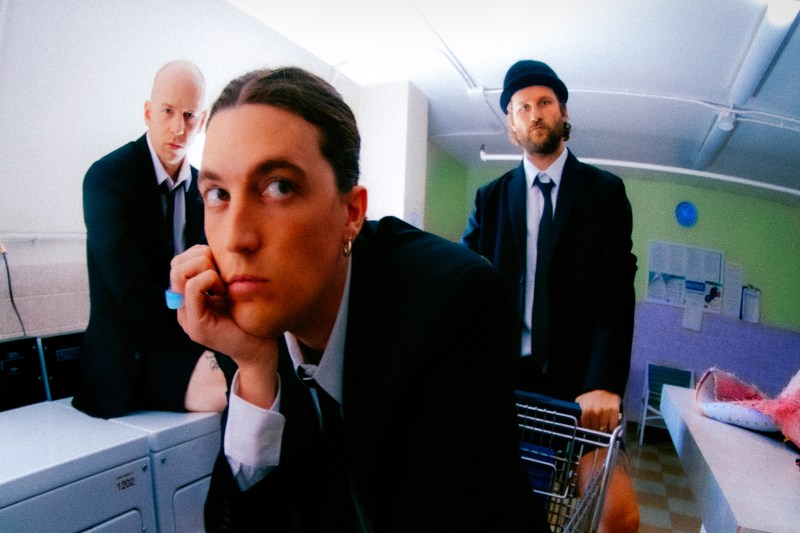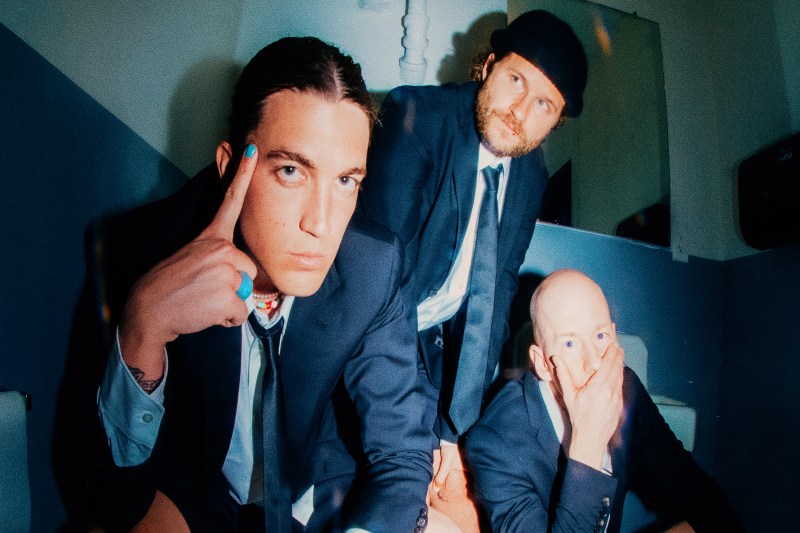
It’s Tuesday, a week and a half before the release day of Dancing in the Kitchen, and Paul Klein’s voice thrills when talking about his band LANY‘s first song of a new album cycle. “I don’t think it’s going to take an educated listener to go, ‘Wow, these drums are way bigger than I’ve ever heard from LANY,’ and, ‘Wow, that sub and that bass is super deep and hits way harder,’ and, ‘Wow, those are those synths that I love, but they’re lusher than ever and louder than ever.’
“Even the visuals of what we’re dialing in,” Klein continues: “Big, big bright colors, big graphics. A lot of joy and a lot of fun in this album.”
Whether he means to or not (and anyone who’s followed LANY will say nothing the band does is unintentional), Klein, 33, is emphasizing the contrast between an as-yet-unnamed fourth record coming out this fall and the band’s third, Mama’s Boy. He’s got to. “The scenic route,” as he describes the 2020 project, was like the trip home you take with a boyfriend or girlfriend once things get serious. It introduced his band’s fanbase to Nashville, a place they’d never associated with it (indeed, its name is an acronym of Los Angeles and New York, the former being where the band is based and where Klein has lived for the band’s entire existence) by blending Klein’s ideas with Los Angeles pop hitmakers and Nashville country mega-writers, producing tracks with the experimentation of an acid trip. This one, a gospel choir, another with a string section. One track even had a flugelhorn. Klein calls it the band’s “dust-on-the-boots moment,” a chance to tinker and explore. But for the next project, he’s righting the ship: “It’s a return,” he says, “but bigger and better than ever.”
Related Guides
LANY, and Klein himself, may be symbolic of the coastal urban centers, their synth-pop sound tailor-made for an Urban Outfitters. But both he and the band have Nashville roots not easily squared with their persona. Klein, with his milk-white skin, hollow cheeks, and pale blue eyes, seems like he could have spawned from the same sparkly woods as Twilight’s Pacific Northwest. The reality is that he was born and raised in Tulsa, Okla., a classically trained pianist since the age of five, and only through the urging of his father did he ever leave. Dad chanced upon Belmont University, a Nashville religious school that has a remarkable amount of high-profile musical alumni across genres. Country music fans would know that members of Florida Georgia Line and Nationwide Insurance salesman Brad Paisley once called it home, and plenty of mainstream acts also passed through its doors, including Judah and the Lion, Moon Taxi, Coin, and others. Klein spent two summers after high school enrolled, and two years total in the city, writing songs while failing unspectacularly.
“I couldn’t even play the bathroom at [venue] 12th and Porter,” he says. “It takes writing a lot of bad songs to finally get to some good ones.”
So Klein gave up on Nashville, just like thousands of other musicians who arrive on its shores every year. They discover that they are not special, songwriting is hard, and even the busboy is a more talented guitarist. But unlike those thousands who, every year, retreat in shame back to their small towns with stories of what could have been while taking over the family farm, Klein gave up on Nashville, rather than himself, and moved to L.A. with the same steadfast belief, which even now he can’t explain.
He puzzles with it for a second. Then, “I guess I’m not very good at giving up.” And that’s all you’re going to get.
The rest, as they say, is history. Six months later, having exercised his songwriting muscles without pause on the West Coast, he cold-called a couple of acquaintances in Nashville. Les Priest and Jake Goss were already in another band, so any Klein-included project would be on the side. Over four days in the spring of 2014, the trio recorded the first two songs in Priest and Goss’s Nashville home, and a few months later, with zero buzz and no followers, LANY released its first two songs into the ether. Smash cut: a headlining worldwide tour, a number-one Billboard chart debut, streams into the mid-billions, and a run of dates with John Mayer and others. “Here we are, seven years later,” Klein says.
Along the way, there have been some unexpected byproducts of his band’s success, including his duet with country star Kelsea Ballerini. The two, with fellow Belmont alum Nicolle Galyon, wrote I Quit Drinking during Klein’s January 2021 writing trip in Nashville for the LANY record. Ballerini was finishing up a dry January, and she mentioned it in passing during those first few minutes of a write when everyone small-talks. Klein caught it. “God, ‘I Quit Drinking’ would be a crazy title,” he thought. So then he began to probe: Why would someone quit drinking? “It came together so effortlessly and so quickly,” he says. “It’s one of the few times that’s happened in my life.”
Upon its finish, they recorded a demo of the song with piano and voice, with Ballerini and Klein starting the first and second verse, respectively, with the phrase, “We used to be.” Told from two different perspectives, it turns out that each character gave up booze because whenever they drank, they would think of the other. While all of the respective parties’ teams liked it, Nashville is filled with reams of un-cut songs that never make it beyond that sparse first recording, and months went by until Ballerini, who was three weeks from her annual hosting of the CMT Music Awards, informed Klein that she wanted to debut it on the night. And so the race began.

Over those 21 days, the two recorded the song on opposite ends of the country, shot a rain-soaked video together in Los Angeles, and somehow made it to the rise of the show’s curtain on June 9, all while still Klein continued work on the LANY record. “I was hopping in and out of mix sessions to cut another [Ballerini] vocal,” he remembers. Dressed in a black Yves Saint Laurent double-breasted suit tailored to perfection, the pair sang their song to each other on Bridgestone Arena’s stage, and at the time of this writing, its video already has more than a million views, with Spotify streams closing in on eight million plays. “Obviously,” Klein says. “it was worth it.”
But now, with his duet released, Klein turns again toward his own work and LANY’s upcoming project.
If Drinking, with its anti-Tears in My Beer theme, was the anti-country country song, LANY’s first single, Dancing in the Kitchen, is synth-pop’s version of a country song. The protagonist, whose lavish lifestyle could transport him and his partner anywhere, prefers to spill Dom Pérignon on their feet as they dance together in the kitchen. Strong visuals like a clear night-time sky mirroring city lights that look like ice and its theme of loyalty and togetherness feel strangely antithetical to California, and, second only to hip-hop, no genre likes product placements more than country music. Just add a banjo, strip the filters from Klein’s voice, and you might have the next Old Town Road.
Whatever you want to call the upcoming album, of which Dancing in the Kitchen is a part, don’t call it a COVID release. “This is not a pandemic record,” Klein says. “In fact, I would rather to never think or talk or remember this last year. The whole idea would be that this album makes you completely forget all the shit we just went through.”
But what else do you call something that was so distinctly shaped by a worldwide pandemic? Written over the course of two trips to Nashville in early 2021, many of his longtime cabal of Los Angeles writers weren’t available due to various coronavirus constraints, and so he tapped a largely new group of writers and producers to collaborate on LANY IV, including David Hodges, a multi-platinum, Grammy, and BMI award-winning writer and producer who’s worked with everyone from Blink-182 to Keith Urban.
By the end of the call, Klein, who previously jet-packed over the band’s early days together, grows nostalgic, and he begins talking about driving his 2008 Honda Element cross-country to Los Angeles, a Nashville failure in his rearview window. “I felt in my spirit, in my stomach, that I needed to go,” he says. After months of scanning Craigslist, he moved into a one-bedroom walkup with no AC in the worst part of Hollywood, and in the summertime heat, when the temperature would rise 20 degrees summiting a single flight of stairs, he’d freeze wet towels, laying them over his naked body at night just so he could fall asleep. For money, he’d hold the door for a fancy store on Rodeo, sweating through his suit. Ten bucks an hour plus tips.
“Could I do that again? If somebody took all this away from me? I don’t know,” he says. “But I love that part of the story. It takes a while to figure out how to do it.”



